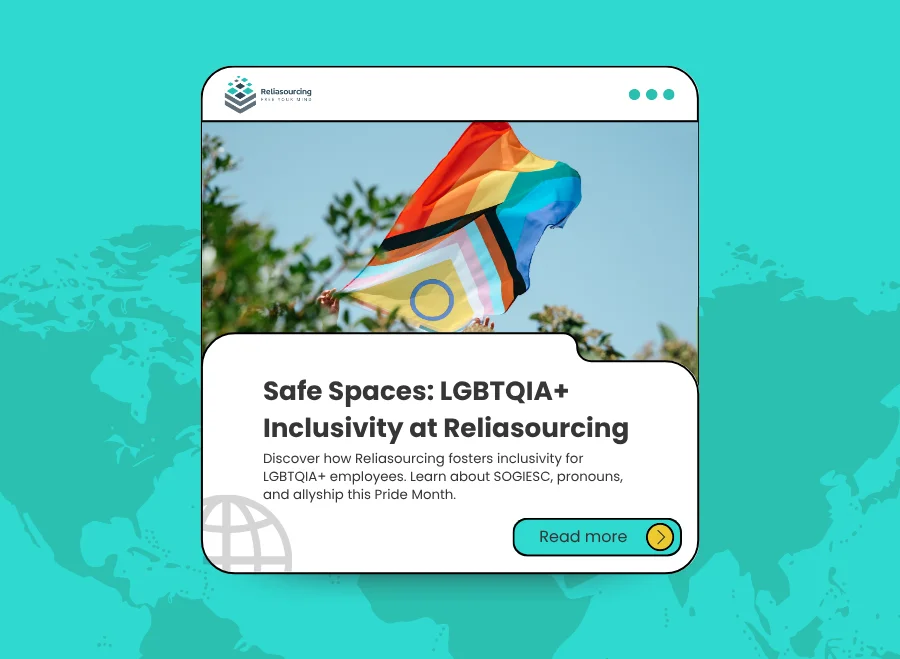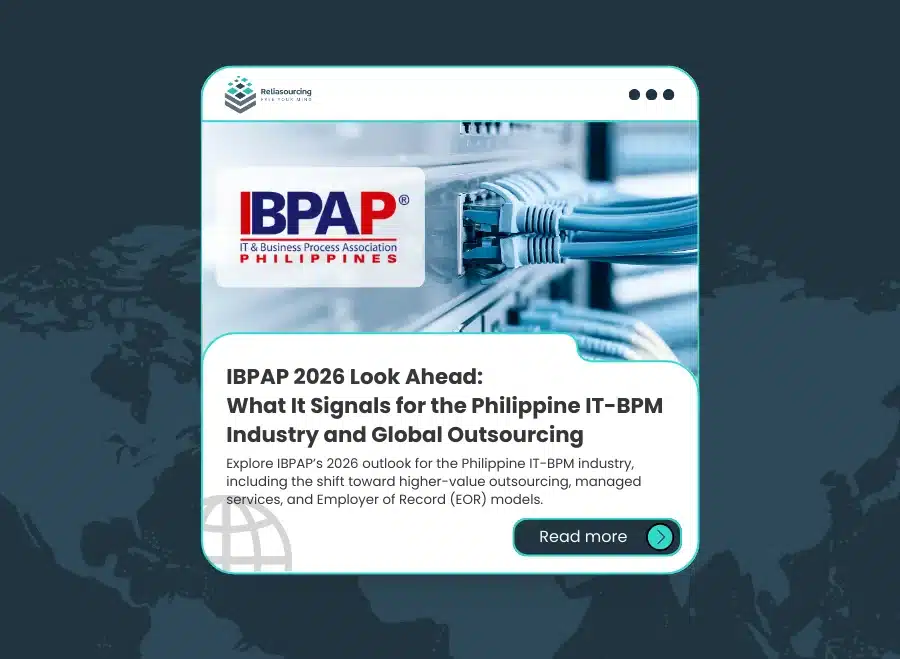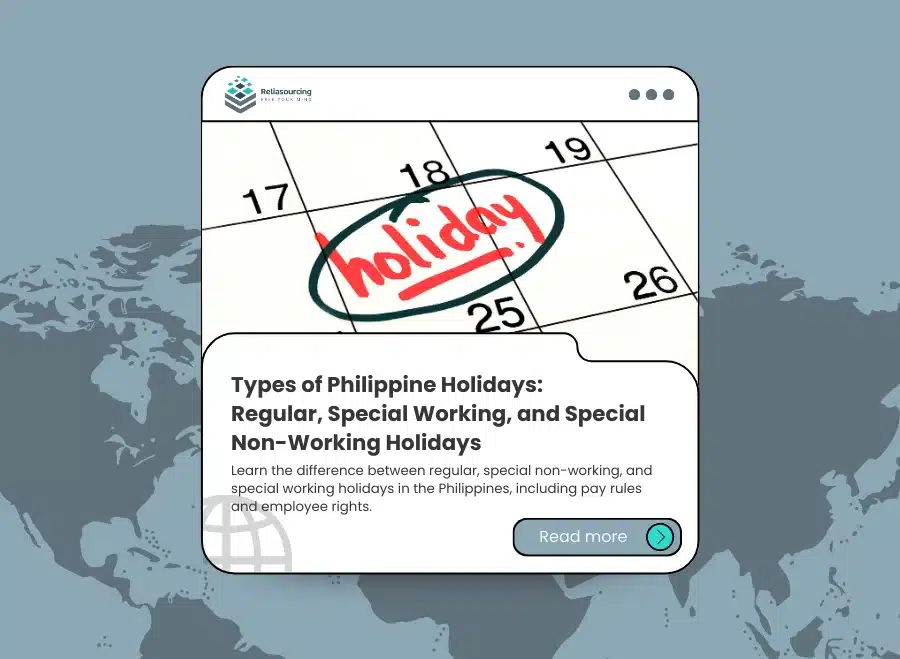June is Pride Month, a time to celebrate the resilience, diversity, and contributions of the LGBTQIA+ community. At Reliasourcing, we recognize that fostering inclusivity is not just a seasonal commitment where we put a rainbow over the company logo. Celebrating pride with the queer community is a year-round responsibility. And this month, we reaffirm our dedication to creating a workspace where everyone feels valued, respected, and empowered to be their authentic selves.
Understanding the LGBTQIA+ Community and SOGIESC
The term LGBTQIA+ encompasses a spectrum of identities: Lesbian, Gay, Bisexual, Transgender, Queer or Questioning, Intersex, Asexual, and others. Each identity represents unique experiences and perspectives that enrich our workplace.
To further our understanding, it’s essential to familiarize ourselves with the term “SOGIESC”:
- Sexual Orientation. Who one is emotionally, romantically, or sexually attracted to.
- Gender Identity. One’s internal understanding and experience of their gender.
- Gender Expression. How one presents their gender through behavior, clothing, and other external characteristics.
- Sex Characteristics. Biological attributes such as chromosomes, hormone levels, and reproductive organs.
Recognizing and respecting SOGIESC is fundamental to promoting LGBTQIA+ inclusivity and dismantling stereotypes that can lead to discrimination.
The Importance of Respecting Pronouns
Using a colleague’s correct pronouns is a basic yet powerful act of respect which acknowledges their identity and fosters a sense of belonging. Misgendering, whether intentional or accidental, can cause feelings of discomfort or exclusion on the part of a person misgendered. Some common pronouns include:
- She/her/hers. Often used by women and some transgender individuals who identify as female.
- He/him/his. Typically used by men and some transgender individuals who identify as male.
- They/them/theirs. Used by people who identify outside the male/female binary; can also be used when someone’s gender is unknown.
Other pronouns may be used by individuals who prefer alternatives beyond the traditional sets. In Filipino, we already use the gender-neutral “siya,” which refers to anyone regardless of gender, clearly an already-existing aspect of the Filipino language that supports inclusion.
If you’re unsure of someone’s pronouns, it’s okay to ask politely. Mistakes happen, what matters is correcting them and being respectful.
A Note on the Complexity of Identity
It’s best to remember that sometimes a person’s SOGIESC may not directly align with their preferred pronoun.
For example, a gay person identifying as a male may present himself in a feminine fashion, but still prefer the pronouns he/him/his. Likewise, a transwoman or a woman, as they may aptly be called, may prefer to use the pronouns she/her/hers. And in the same way, a man who is pansexual (sexual orientation where one is attracted to all genders or regardless of it) and presents himself in a masculine manner may prefer to be called using any pronoun.
There is no clear-cut demarcation in one’s SOGIESC and pronouns since it all lies on a spectrum, which may be defined from the start or continue to change through time.
Addressing Workplace Disparities
Despite progress, LGBTQIA+ individuals often face challenges in the workplace. A study found that LGBTQIA+ Filipinos are twice as likely to be underemployed compared to their non-LGBTQIA+ counterparts—often due to discrimination, lack of inclusive hiring practices, or unsupportive work environments.
These disparities extend beyond hiring. LGBTQIA+ professionals may face limited opportunities for promotion, exclusion from informal networks, or pressure to conceal their identities to avoid bias or harassment. Transgender individuals, in particular, are often subjected to heightened scrutiny regarding their appearance and bathroom use.
At a systemic level, the absence of inclusive benefits—such as gender-affirming healthcare or recognition of same-sex partners in insurance policies—can further marginalize LGBTQIA+ employees. Workplace microaggressions, though subtle, can also contribute to a hostile environment and hinder professional growth.
Encouragingly, the BPO industry in the Philippines has made notable strides in fostering inclusivity. As one of the country’s largest and most diverse employment sectors, BPOs have the capacity to lead by example in implementing inclusive practices. Many companies now embrace diversity through training, LGBTQIA+ support groups, and SOGIESC-aware policies.
At Reliasourcing, we actively contribute to this progress by:
- Promoting inclusive hiring and promotion practices;
- Ensuring respectful use of pronouns and identities;
- Providing HR support for LGBTQIA+-related concerns;
- Creating safe spaces and support channels for open dialogue.
Recognizing these inequities means committing to concrete actions: equitable recruitment, inclusive benefits, strong anti-discrimination policies, and a culture that encourages open dialogue and support. Proactive measures like these prove essential to creating a work environment where LGBTQIA+ individuals are not only welcome, but empowered to succeed.
Reliasourcing’s Commitment to Inclusivity
Reliasourcing, in celebration of Pride Month, continues to commit itself to inclusivity. We are proud of the strides we’ve made:
- Inclusive Facilities. Our office provides same-sex bathroom options for back-office employees. Additionally, the common restrooms in our building are inclusive, allowing individuals to use facilities that align with their gender identity.
- Pride Month Celebration. As an annual event, Reliasourcing joins the queer community in commemorating the month that seeks inclusivity and progress in all sectors of society.
- Employee Well-Being. Part of our Pride Month celebration is the annual free HIV screenings at the office to continuously provide access to healthcare and raise awareness about the importance of regular check-ups.
- Policy Development. We continuously review and update our policies to protect against discrimination and to support diversity in all forms.
Becoming an Effective Ally
Allyship involves ongoing learning and action. Here are ways to support our LGBTQIA+ colleagues:
- Educate Yourself. Seek out resources to understand the experiences and challenges faced by the LGBTQIA+ community.
- Speak Up. Challenge discriminatory remarks or behaviors when you witness them.
- Support Inclusive Policies. Advocate for company policies that promote diversity and protect against discrimination.
- Listen and Learn. Create space for LGBTQIA+ voices and experiences to be heard and valued.
We need not speak for them, we speak with them, and it all begins with fostering a space where they can freely speak their mind.
Looking Ahead
Building an inclusive workplace is an ongoing journey that requires commitment from all levels of the organization. Embracing diversity allows us to uphold our values and likewise enhance our collective creativity, collaboration, and success.
Let’s continue to work together to ensure that Reliasourcing remains a place where everyone can thrive. Happy Pride Month to all!
Join the Conversation
We invite all team members to share their ideas on how we can further promote inclusivity within our workplace. Reach out to your team leaders or the HR department to learn more about our ongoing initiatives.
About Reliasourcing
Reliasourcing is a premier outsourcing solutions provider in the Philippines. We deliver tailored services that help businesses across industries achieve operational efficiency and scalability. With a focus on customer experience and innovation, Reliasourcing continues to be a trusted partner in unlocking potential through outsourcing.
Follow us on Facebook, Instagram, LinkedIn, YouTube, and X for more information on the latest trends and insights in outsourcing, the industry, and the Philippines.
Connect with us, or become part of our growing team today!









